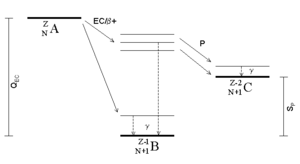- Proton emission
-
Proton emission (also known as proton radioactivity) is a type of radioactive decay in which a proton is ejected from a nucleus.
 The decay of a proton rich nucleus A populates excited states of a daughter nucleus B by β+ emission or electron capture (EC). Those excited states that lie below the separation energy for protons (Sp) decay by γ emission towards the groundstate of daughter B. For the higher excited states a competitive decay channel of proton emission to the granddaughter C exists, called β-delayed proton emission.
The decay of a proton rich nucleus A populates excited states of a daughter nucleus B by β+ emission or electron capture (EC). Those excited states that lie below the separation energy for protons (Sp) decay by γ emission towards the groundstate of daughter B. For the higher excited states a competitive decay channel of proton emission to the granddaughter C exists, called β-delayed proton emission.
Proton emission can occur from high-lying excited states in a nucleus following a beta decay, in which case the process is known as beta-delayed proton emission, or can occur from the ground state (or a low-lying isomer) of very proton-rich nuclei, in which case the process is very similar to alpha decay.
For a proton to escape a nucleus, the proton separation energy must be negative - the proton is therefore unbound, and tunnels out of the nucleus in a finite time. Proton emission is not seen in naturally occurring isotopes; proton emitters can be produced via nuclear reactions, usually utilising some kind of particle accelerator.
Although prompt (i.e. not beta-delayed) proton emission was observed from an isomer in Cobalt-53 as early as 1969, no other proton-emitting states were found until 1981, when the proton radioactive ground states of Lutetium-151 and Thulium-147 were observed at experiments at the GSI in West Germany.[citation needed] Research in the field flourished after this breakthrough, and to date more than 25 isotopes have been found to exhibit proton emission. The study of proton emission has aided the understanding of nuclear deformation, masses and structure, and it is a wonderfully pure example of quantum tunneling.
In 2002, the simultaneous emission of two protons was observed from the nucleus Iron-45 in experiments at GSI and GANIL (Grand Accélérateur National d'Ions Lourds, near Caen). In 2005 it was experimentally determined (at the same facility) that Zinc-54 can also undergo double proton decay.
See also
- Proton drip line
- Diproton (a particle possibly involved in double proton decay)
- Free neutron
External links
 Nuclear Structure and Decay Data - IAEA with query on Proton Separation Energy
Nuclear Structure and Decay Data - IAEA with query on Proton Separation Energy
Nuclear processes Radioactive decay Stellar nucleosynthesis pp-chain · CNO cycle · α process · Triple-α · Carbon burning · Ne burning · O burning · Si burning · R-process · S-process · P-process · Rp-process
Other processes EmissionCaptureCategories:- Nuclear physics
- Radioactivity
Wikimedia Foundation. 2010.
